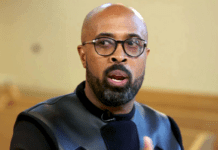“It was more an issue of Bubba not being in a place that he could receive help,” Crawford told Baptist Press via email. “When a young person’s maladaptive behavior is being supported by a negative peer group (with whom they spend significant time) and outpatient therapy offers very limited time and points of contact, it is necessary for a young person to spend some time in a healthier peer group with much more frequent opportunities for intervention and guidance.”
The Brocards’ step may have seemed extreme. But those situations happen, Crawford added.
“No parent can ultimately control the environment of a teenager,” he said. “More structured treatment centers are able to provide the structure that one cannot provide when a teen lives at home.”
For Bubba, the time in Utah brought separation from negative influences. It also brought a sense of clarity.
“He connected the dots,” John said. “He realized that God loves him and has a plan for him and that we didn’t do that out of anger. We did that out of love.”
RELATED: What if the Prodigal Returns to a Ruined Farm?
Bubba would go on after that experience to get involved with a Bible study group and graduate from college. He even eventually worked with a similar organization as one of the men to escort teens, just as he had experienced.
“It was a reward and a nightmare at the same time to be working with them,” he told the Atlanta Journal Constitution in a 2008 article about PCM. “I knew how it felt when I was escorted, and it wasn’t good. I felt a lot of kids I transported felt the same way. … But I was there because I believed in the program and knew it could help these kids, and that’s what I’d tell them.”
Now 40 years old, Bubba is married and about to become a father. He owns the CrossFit gym John frequents four times a week.
The holidays are known for families being together. They are also known for the conflicts those gatherings can bring. Political polarization, economic difficulties, social media and the pandemic are all contributors to that tension, Crawford said, as is “the undeniable reduction in church attendance and participation in communities of faith.”
“We know that domestic violence rates and substance abuse rates increased dramatically during the worst period of the pandemic,” he said. “We also know that social isolation and not attending school has had significant negative effects on the mental health of youth.”
Leaning on God’s guidance and a support group are instrumental for parents of a prodigal child, said John. He agrees that the holidays can be trying for parents of a prodigal who is living outside of the home and will be coming back to visit.
“Thanksgiving and Christmas can be difficult because kids bring their baggage home with them,” he said. “We suggest parents set ground rules. If their kid is going to continue to abuse drugs, for instance, they can’t be there.
“It’s not casting them out, but loving them enough to set parameters. You’re there to help them, but not going to let them ruin the celebration.”
Through their experience, John and Fair Brocard’s perception changed toward others.
“God can use your prodigal to change your heart,” John said. “We were churchgoing people, but inwardly were judgmental. We thought we knew what unconditional love and surrender were. We didn’t get it until we had to let our son go.”
“In 1998 we didn’t know anything about treatment programs or other resources,” Fair said. “Our church has been very supportive in helping us build awareness.”
The oft-cited parable of the Prodigal Son in the Bible tells of unconditional love. But there is a way parents may misinterpret it, Crawford said.
“To be sure, it shows us the never-failing love, grace and mercy of God toward us,” he said. “On a more mundane level, the parable encourages us to maintain hope and know that God does not abandon us in our most difficult times.”
But he pointed out, parents may get the wrong idea in how the parable can be perceived as “neat and tidy.”
“Many times, it isn’t quite that linear or ‘neat,’” he wrote. “The journey of a prodigal in a family is often nonlinear (recovery, relapse – rinse and repeat) before stability is reached. Also, it is ‘easy’ to forgive and reconcile with someone who returns in humility. However, it is more difficult to maintain a loving stance with someone who has not reached that place.”
And when the path gets long, the need for help grows.
“Churches should have compassion for families dealing with a prodigal and offer to love, support, and pray for them,” Crawford said.
This article originally appeared at Baptist Press.











